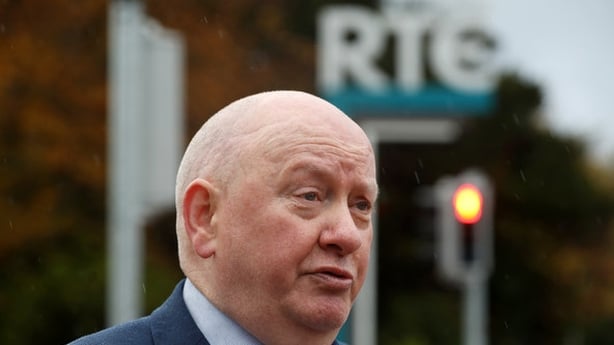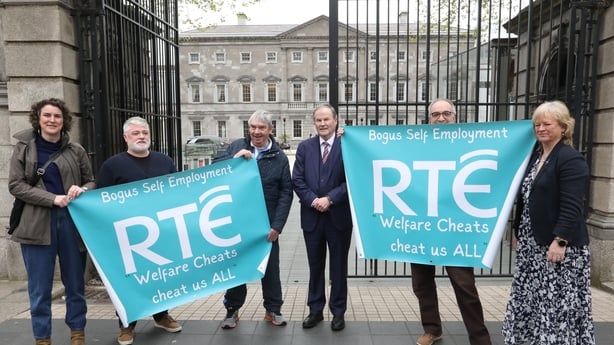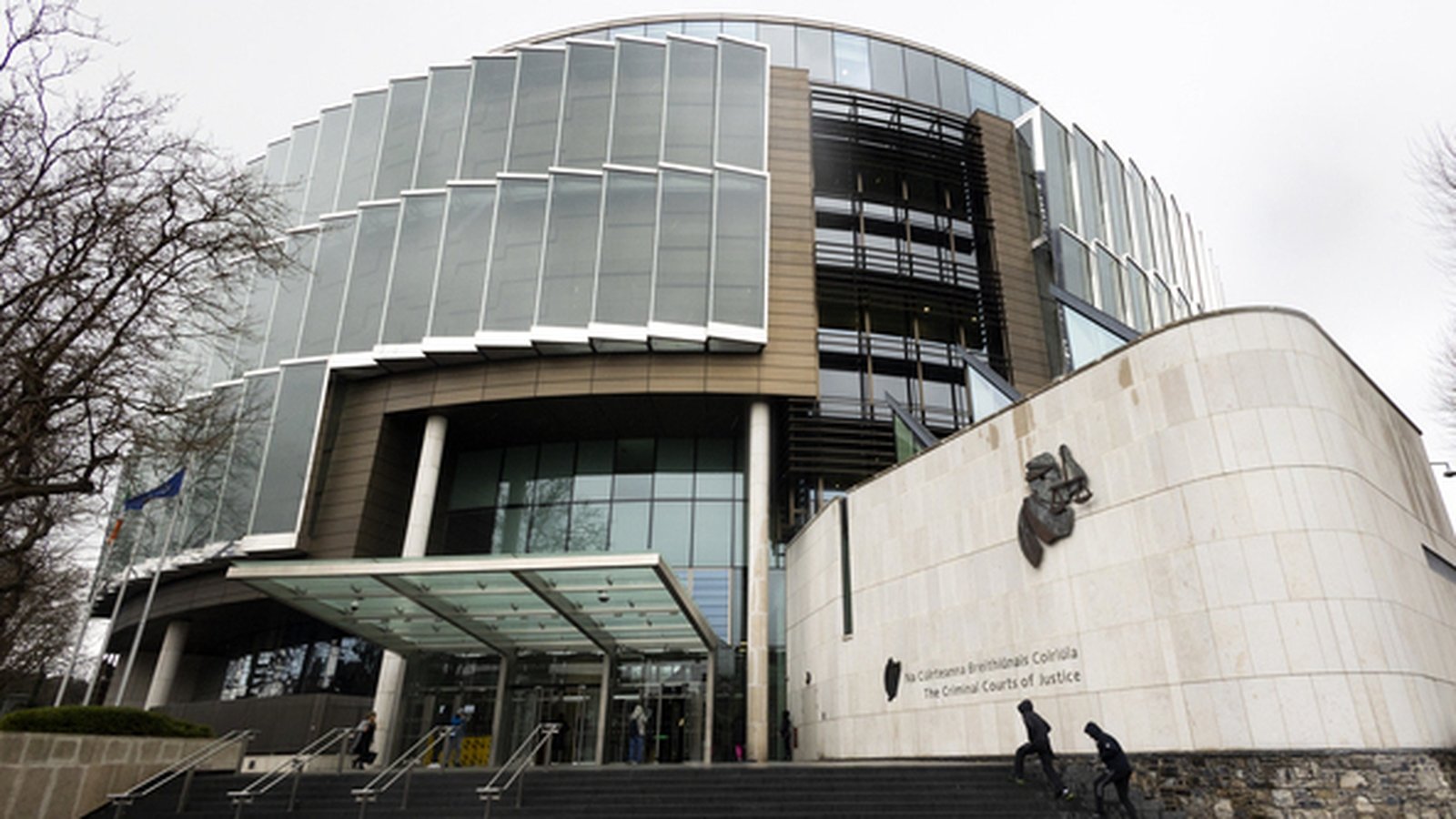Out of contract: Employment issues at RTÉ

The employment status of workers at RTÉ was back in the spotlight this week.
On Wednesday, trade unions appeared before the Oireachtas Media Committee highlighting concerns around so-called bogus self-employed staff.
At the same time, the issue was also being discussed at a staff meeting in RTÉ.
What does ‘bogus-self employment’ mean?
Bogus self-employment refers to the practice of misclassifying a worker as self-employed even though they act in the capacity of an employee.
It affects a worker’s entitlements to social insurance, pensions, maternity and paternity leave, holiday pay and illness cover.
It also makes it harder for those workers to apply for mortgages, loans and credit cards.
In January, Secretary General of the Department of Social Protection John McKeon appeared before the Public Accounts Committee and outlined the sectors it is investigating to establish the prevalence of bogus self-employment.
“The sectors we’re looking at the moment would be the media and journalism sector,” Mr McKeon said.
“We’re also looking at the airline sector, and we do tend to look at the higher education sector,” he added.
Mr McKeon said that, in 2023, it looked at 1,000 different workers across 300 employers.
The committee heard that the Department of Social Protection has added 12 new staff to its employment status investigation unit, bringing the total number of investigators to 18.
RTÉ investigation
The ‘Scope Section’ of the Department of Social Protection investigates employments to ensure the correct class of PRSI is being applied.
Investigators are reviewing 695 cases at RTÉ.
The broadcaster provided an update this week on the status of the probe.
It said that of the 695 cases under review, 363 individuals are no longer providing services to RTÉ.
It added that 105 individuals are employees and the majority of all others currently engaged provide services as contributors, primarily in sport and across radio and television.
Under the ‘scope’ investigation, 167 cases have been processed to date, or are being processed, and RTÉ has so far appealed 31 cases.

“Any appeal is on the basis that there has potentially been a mistake made on facts or in law,” a spokesperson said.
“RTÉ is working hard to resolve the outstanding scope cases and it remains a priority for the organisation,” they added.
The broadcaster set aside a provision of approximately €15m for payments arising from the Scope process.
The issue was discussed at an RTÉ staff meeting on Wednesday.
According to people who were at the meeting, Director General Kevin Bakhurst expressed his desire to resolve the matter soon.
“We are keen to get it done as quick as we can and we pushing ahead to resolve this as soon as possible,” Mr Bakhurst said.
Eversheds Sutherland review
In 2018, legal firm Eversheds Sutherland published a review showing that up to 157 workers at RTÉ may have been misclassified as self-employed.
The broadcaster commissioned the report after complaints by unions that hundreds of workers could have been hired as self-employed freelancers, rather than as direct employees.
Of the 433 contracts reviewed, 106 were assessed as “having attributes akin to employment” and requiring individual review.
A further 51 contractors were found to have attributes akin to both employment and self-employment, and would also require review.
RTÉ later offered employment contracts to 82 people, with 79 accepting.
Union anger
The terms ‘Eversheds’ and ‘scope’ were mentioned repeatedly on Wednesday when trade unions representing RTÉ staff appeared before the Oireachtas Media Committee.
In its submission to the committee, SIPTU described hiring practices at RTÉ as “mismanagement” and a ‘”fiasco”.
The union claimed that a large number of RTÉ workers had their employment regularised prior to the Eversheds process, meaning they were excluded from any offers relating to retrospective losses.
The National Union of Journalists (NUJ) told the committee that unions have a long history of opposing bogus self-employment contracts.
“Bogus self-employment was forced upon many workers who had no alternative but to accept the false premise that they were not employees,” the NUJ said in its submission.

The Connect trade union highlighted that bogus self-employment disproportionately affects younger and female workers.
Representatives said that it erodes training and opportunities to acquire new skills, as well as undermining pay and conditions.
“Bogus self-employed workers are much less likely to secure loans and mortgages thus affecting their ability to purchase a home (thus contributing to the housing crisis),” Connect said in its submission to the committee.
Wider impact
The Unite trade union told the committee that bogus self-employment is a feature across a range of sectors and that it is particularly widespread in construction and English language teaching.
The union said precarious working impacts on workers, compliant employers and the wider economy.
It embeds inequality into the workplace, and limits workers’ access to benefits and protections against unfair dismissal or discrimination, according to Unite.
“Employers who misclassify workers as self-employed, or who engage in other forms of precarious employment, have an unfair competitive advantage over other employers,” the union said.
Unite warned that the non-payment of employers’ PRSI not only reduces the money available to the social insurance fund but also reduces individual workers’ social insurance entitlements.
“Some years ago the Irish Congress of Trade Unions estimated that bogus self-employment in the construction sector alone cost the Exchequer €80 million per annum, and the figure is now likely to be significantly higher,” Unite said.
The union outlined a number of proposals it put forward in 2021 aimed at tackling bogus self-employment.
Recommendations included the establishment of a ‘presumption of employment’, updating the Code of Practice on Determining Employment Status, and the development of standard definitions of the terms ‘employee’ and ‘worker’, to be incorporated into all relevant legislation.
Worker frustration
At Wednesday’s hearing, Fine Gael TD Brendan Griffin read some of the contributions the committee had received from workers, with many describing their frustration at the fees RTÉ is paying to legal firms instead of protecting staff.
Sinn Féin TD Imelda Munster questioned the role of unions and accused them of doing little or nothing to support workers who had been subjected to precarious working conditions.
“How was a scandal like that not tackled?” Ms Munster asked.
Irish Secretary of the NUJ Seamus Dooley defended the role of unions and pointed out that going back over 20 years he was involved in advising workers on unsatisfactory contracts.
He added that it was strange and curious for unions to “take a punishment beating” for the actions of management.

While the committee hearing was taking place inside, outside a group of former and current RTÉ workers gathered at the gates of Leinster House.
Some of them spoke of the stress and fear of not knowing if their contracts would be renewed or employments continued.
Others described putting aspects of their lives on hold due to the precarious nature of their working arrangements.
For years, the only time pay and conditions at RTÉ made headlines was in relation to the salaries of the top earners at the broadcaster.
That level of media interest reached new levels last year when news broke of the payments controversy involving Ryan Tubridy.
The ensuing fallout saw protests by RTÉ staff and public statements highlighting low pay levels and unsatisfactory working conditions.

Media Minister Catherine Martin ordered a review of contractor fees and HR matters at the broadcaster.
An expert advisory committee has been examining issues such as the use of agents and short-term employment contracts.
The report is expected to be published in the coming weeks.
Management at RTÉ has vowed to address staff concerns and not to repeat the mistakes of the past.
Whether it is a fall in licence fee revenue, or the erosion of public trust, recent controversies at RTÉ have caused major damage to the broadcaster.
But they have also served to shine a light on the experiences of ordinary workers and prompted commitments that things will get better.





